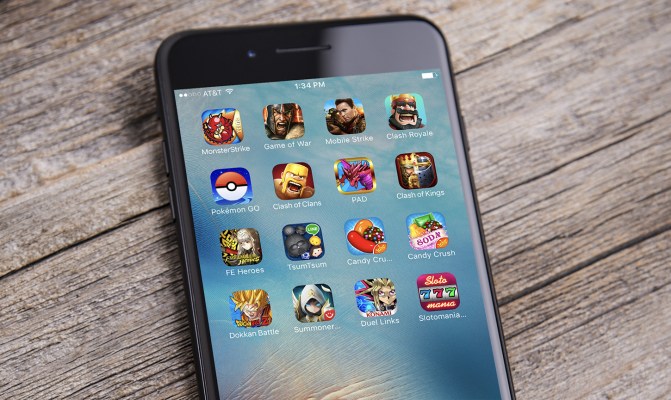By the end of 2019, the global gaming market is estimated to be worth $152 billion, with 45% of that, $68.5 billion, coming directly from mobile games. With this tremendous growth (10.2% YoY to be precise) has come a flurry of investments and acquisitions, everyone wanting a cut of the pie. In fact, over the last 18 months, the global gaming industry has seen $9.6 billion in investments and if investments continue at this current pace, the amount of investment generated in 2018-19 will be higher than the eight previous years combined.
What’s interesting is why everyone is talking about games, and who in the market is responding to this — and how.
The gaming phenomenon
Today, mobile games account for 33% of all app downloads, 74% of consumer spend and 10% of all time spent in-app. It’s predicted that in 2019, 2.4 billion people will play mobile games around the world — that’s almost one-third of the global population. In fact, 50% of mobile app users play games, making this app category as popular as music apps like Spotify and Apple Music, and second only to social media and communications apps in terms of time spent.
In the U.S., time spent on mobile devices has also officially outpaced that of television — with users spending eight more minutes per day on their mobile devices. By 2021, this number is predicted to increase to more than 30 minutes. Apps are the new prime time, and games have grabbed the lion’s share.
Accessibility is the highest it’s ever been as barriers to entry are virtually non-existent. From casual games to the recent rise of the wildly popular hyper-casual genre of games that are quick to download, easy to play and lend themselves to being played in short sessions throughout the day, games are played by almost every demographic stratum of society. Today, the average age of a mobile gamer is 36.3 (compared with 27.7 in 2014), the gender split is 51% female, 49% male, and one-third of all gamers are between the ages of 36-50 — a far cry from the traditional stereotype of a “gamer.”
With these demographic, geographic and consumption sea-changes in the mobile ecosystem and entertainment landscape, it’s no surprise that the game space is getting increased attention and investment, not just from within the industry, but more recently from traditional financial markets and even governments. Let’s look at how the markets have responded to the rise of gaming.

Image courtesy of David Maung/Bloomberg via Getty Images
Games on games
The first substantial investments in mobile gaming came from those who already had a stake in the industry. Tencent invested $90 million in Pocket Gems and$126 million in Glu Mobile (for a 14.6% stake), gaming powerhouse Supercell invested $5 million in mobile game studio Redemption Games, Boom Fantasy raised $2M million from ESPN and the MLB and Gamelynx raised $1.2 million from several investors — one of which was Riot Games. Most recently, Ubisoft acquired a 70% stake in Green Panda Games to bolster its foot in the hyper-casual gaming market.
Additionally, bigger gaming studios began to acquire smaller ones. Zynga bought Gram Games, Ubisoft acquired Ketchapp, Niantic purchased Seismic Games and Tencent bought Supercell (as well as a 40% stake in Epic Games). And the list goes on.
Wall Street wakes up
Beyond the flurry of investments and acquisitions from within the game industry, games are also generating huge amounts of revenue. Since launch, Pokémon GO has generated $2.3 billion in revenue and Fortnite has amassed some 250 million players. This is catching the attention of more traditional financial institutions, like private equity firms and VCs, which are now looking at a variety of investment options in gaming — not just of gaming studios, but all those who have a stake in or support the industry.
In May 2018, hyper-casual mobile gaming studio Voodoo announced a $200 million investment from Goldman Sachs’ private equity investment arm. For the first time ever, a mobile gaming studio attracted the attention of a venerable old financial institution. The explosion of the hyper-casual genre and the scale its titles are capable of achieving, together with the intensely iterative, data-driven business model afforded by the low production costs of games like this, were catching the attention of investors outside of the gaming world, looking for the next big growth opportunity.
The trend continued. In July 2018, private equity firm KKR bought a $400 million minority stake in AppLovin and now, exactly one year later, Blackstone announced their plan to acquire mobile ad-network Vungle for a reported $750 million. Not only is money going into gaming studios, but investments are being made into companies whose technology supports the mobile gaming space. Traditional investors are finally taking notice of the mobile gaming ecosystem as a whole and the explosive growth it has produced in recent years. This year alone mobile games are expected to generate $55 billion in revenue, so this new wave of investment interest should really come as no surprise.

A woman holds up her cell phone as she plays the Pokemon GO game in Lafayette Park in front of the White House in Washington, DC, July 12, 2016. (Photo: JIM WATSON/AFP/Getty Images)
Government intervention
Most recently, governments are realizing the potential and reach of the gaming industry and making their own investment moves. We’re seeing governments establish funds that support local gaming businesses — providing incentives for gaming studios to develop and retain their creatives, technology and employees locally — as well as programs that aim to attract foreign talent.
As uncertainty looms in England surrounding Brexit, France has jumped on the opportunity with “Join the Game.” They’re painting France as an international hub that is already home to many successful gaming studios, and they’re offering tax breaks and plenty of funding options — for everything from R&D to the production of community events. Their website even has an entire page dedicated to “getting settled in France,” in English, with a step-by-step guide on how game developers should prepare for their arrival.
The U.K. Department for International Trade used this year’s Game Developers Conference as a backdrop for the promotion of their games fund — calling the U.K. “one of the most flourishing game developing ecosystems in the world.” The U.K. Games Fund allows for both local and foreign-owned gaming companies with a presence in the U.K. to apply for tax breaks. And ever since France announced their fund, more and more people have begun encouraging the British government to expand their program, saying that the U.K. gaming ecosystem should be “retained and enhanced.” But, not only does the government take gaming seriously, the Queen does as well. In 2008, David Darling, the CEO of hyper-casual game studio Kwalee, was made a Commander of the Order of the British Empire (CBE) for his services to the games industry. CBE is the third-highest honor the Queen can bestow on a British citizen.
Over in Germany, and the government has allocated €50 million of its 2019 budget for the creation of a games fund. In Sweden, the Sweden Game Arena is a public-private partnership that helps students develop games using government-funded offices and equipment. It also links students and startups with established companies and investors. While these numbers dwarf the investment of more commercial or financial players, the sudden uptick in interest governments are paying to the game space indicate just how exciting and lucrative gaming has become.
Support is coming from all levels
The evolution of investment in the gaming space is indicative of the stratospheric growth, massive revenue, strong user engagement and extensive demographic and geographic reach of mobile gaming. With the global games industry projected to be worth a quarter of a trillion dollars by 2023, it comes as no surprise that the diverse players globally have finally realized its true potential and have embraced the gaming ecosystem as a whole.
